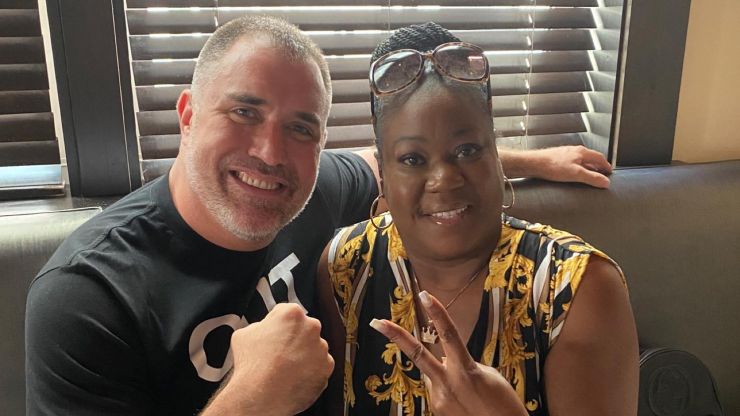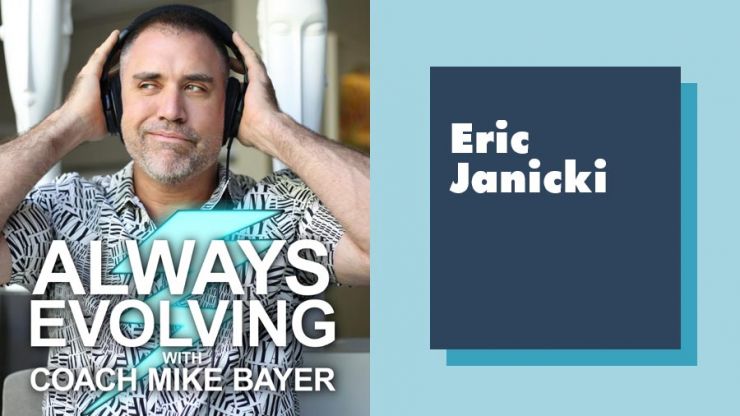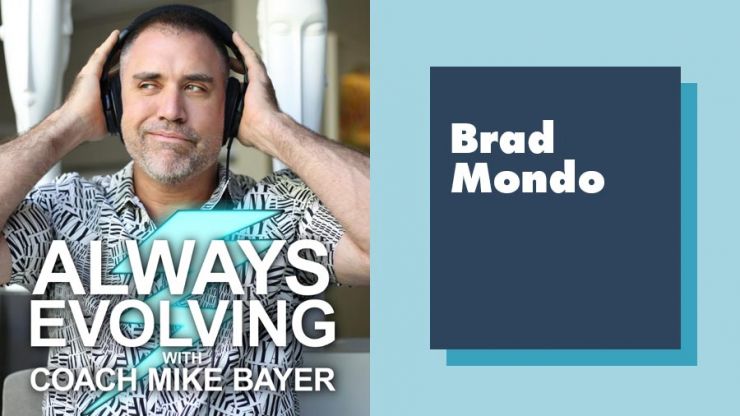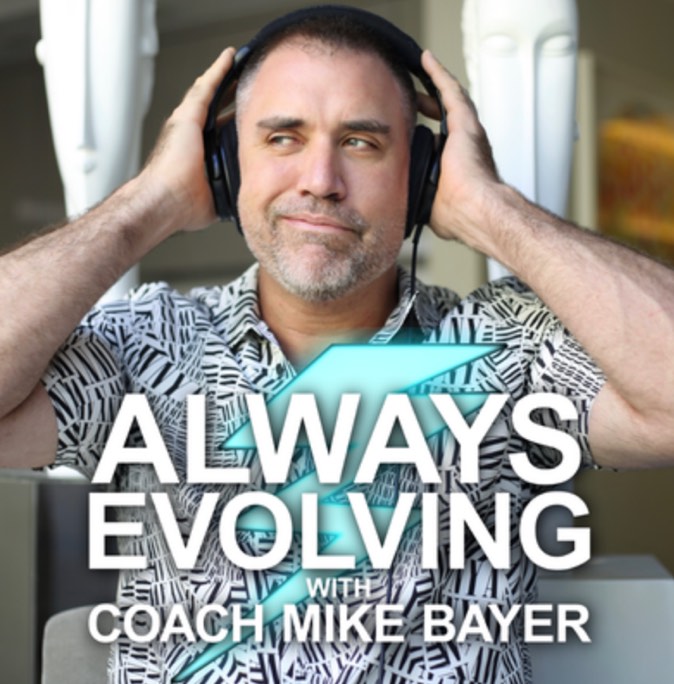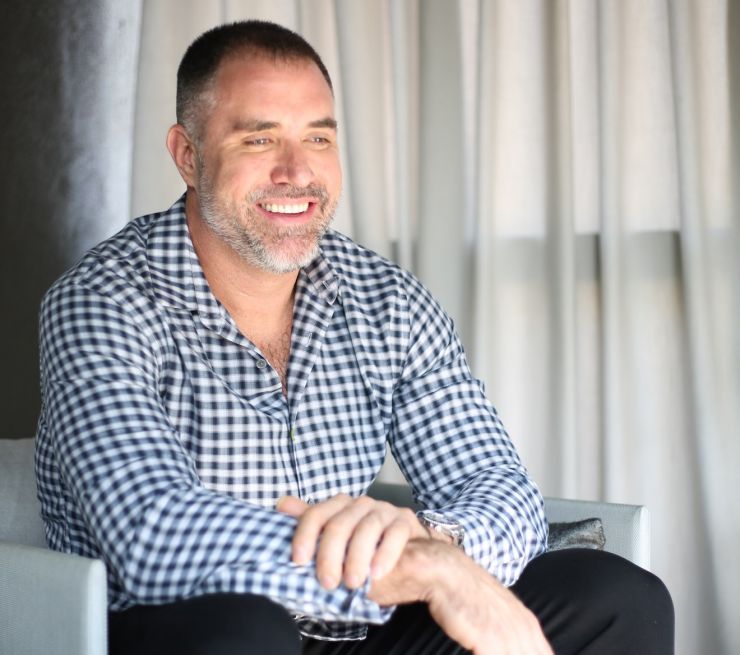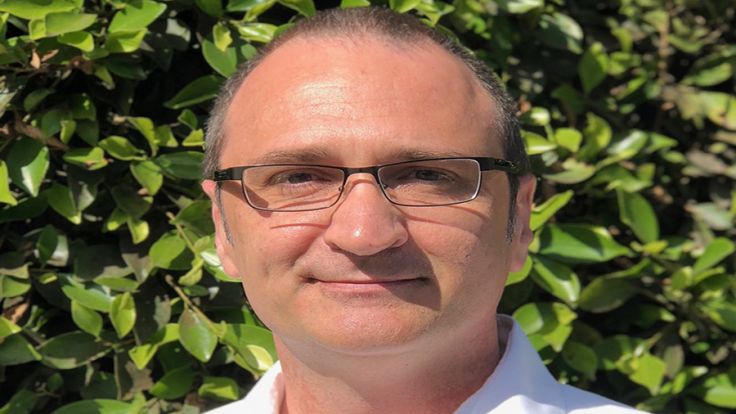
From Addiction to Suicide: Coach Mike’s Treatment Center Director Robert Lien Addresses Mental Health Issues!
07/31/20
DATE: JULY 31, 2020
PROGRAM: ALWAYS EVOLVING W. COACH MIKE BAYER
SHOW#: CM1033
SHOW GUEST: ROBERT LIEN
HOST: MIKE BAYER
(START PODCAST)
COACH MIKE BAYER: Welcome back to “Always Evolving” with me, Mike Bayer, AKA “Coach Mike”. Many of you know I own a treatment center. I founded it over 14 years ago, it’s called “Cast Centers”. It’s in Los Angeles California and my guest today on “Always Evolving” is someone you maybe have spoken to or you can call any time. His name is Robert Lien and he’s my admissions director over here at “Cast Centers” and we’re gonna be talking about the landscape of treatment, what has changed since coronavirus, COVID-19, a little bit about his story and also provide some resources for you. So in case you or someone you know is struggling, you know who you’re talking to on the other end, so thanks Robert.
ROBERT LIEN: Hey Mike. Good to be here. It’s actually my first podcast ever.
MIKE: That you’ve been on?
ROBERT: Yep.
MIKE: Nice.
ROBERT: Yeah.
MIKE: Well thanks for doing it. What it-- first ever. Have you always wanted to be on one?
ROBERT: No, but I have friends in the community...
MIKE: (LAUGHTER)
ROBERT: ...you know musicians…
MIKE: Yeah.
ROBERT: ...and comedians that have their own podcast, so I always, you know, hear about their adventures on their podcast.
MIKE: And Robert, tell everyone a little bit about how you ended up working in the treatment industry?
ROBERT: It’s one of these stories that I never-- I never would’ve imagined I would be sitting in here, uh, working in this field. You know I-- I grew up, uh, dreaming of being a hockey player. That changed, what, after a major injury and then I kinda fell into the music industry and worked as an audio engineer for years. And I toured mixing live music and got into studio work here in Los Angeles doing film post production making records and um, I hit a wall. My lifestyle that I was living wasn’t-- wasn’t healthy and it wasn’t conducive to who I wanted to be as a person.
MIKE: Why wasn’t it healthy?
ROBERT: Drugs and alcohol, depression, anger, fear, um all those things were, were taking me down. And I found myself in a position I wasn’t able to hold jobs, um I wasn’t (STAMMER) able to hold relationships personally, professionally and uh I-- I got the opportunity to make a change.
MIKE: And did you-- when (STAMMER) you-- I don’t know this about your story, but when you decided to make a change in your life, did you-- did it work the first time or?
ROBERT: Yes.
MIKE: It did?
ROBERT: Yeah. I’m one of the very lucky people. And I-- and I can say that because I talk to thousands of people a year...
MIKE: Yeah.
ROBERT: ...who have not been as fortunate as I have. Um, you know I went to the right place at the right time…
MIKE: Yeah.
ROBERT: ...and I heard the message and I followed directions. And getting into this field specifically I, I really had nowhere else to go. And the facility that I went to said, “Well why don’t you give this a try and, you know, we’ll help you out.” Um and I started by mopping the kitchen floor, taking out the trash…
MIKE: Yeah.
ROBERT: ...doing the kind of janitor stuff, um and that’s where I actually got my start in treatment.
MIKE: Yeah. You know I-- I too when I made a decision this last time to make a full on commitment to get abstinent, I too got it that time.
ROBERT: Yeah.
MIKE: You know? And uh how long you been sober now?
ROBERT: Seventeen years.
MIKE: Seventeen?
ROBERT: Yeah. Yeah.
MIKE: I’m your older brother.
ROBERT: (LAUGHTER)
MIKE: Got a little…
ROBERT: I’m right behind ya’.
MIKE: ...a little over 18. So you’ve worked with tens of thousands of, I would say you’ve hand (STAMMER). Prior to Robert working with me you-- you worked at the Betty Ford Center and you’ve done admissions for years. You've spoken to tens of thousands of people. What do you find is the difference between someone who decides to make a change and someone who is just calling and can’t just make a decision?
ROBERT: There’s a lot of people that know that they-- they need to change. They know that the lifestyle they’re living is not who they want to be. They’re not where they saw themselves being and so they may be reaching out for help knowing that, “I’ve gotta do something different, but I don’t know how.”
MIKE: Mm.
ROBERT: And those are kind of those initial first time callers. Um but then there’s the people that have been in and out of sobriety or in and out treatment for mental health and they keep falling back and um-- and they don’t understand why. And so, you know our approach at “Cast” specifically, is not this should be a punishment or a consequence that’s negative. It’s, “Let’s learn from that experience and go forward.”
MIKE: So the difference between someone making a decision to get help and not get help, how often is it? Do you believe it’s money versus a real desire to change?
ROBERT: There’s often times those consequences behind the scenes, like maybe they’re in trouble or-- or maybe they’re in trouble with the family so there’s that pressure and they don’t necessarily believe that the problem is as bad as they think it is. And so that desire to change is typically as strong as strong with those people ‘cause they think they can still control and enjoy it.
MIKE: Hmm. But like, do you think that-- because you’ll talk to people who, who you haven’t-- they, they may call you back a year later and all of a sudden they’re ready to change. Is their life much different in that year that they wait?
ROBERT: Yeah, oftentimes the consequences have piled up, pressure from the family or the employer, financial, they’ve lost everything or on the brink of losing everything.
MIKE: Is it hard for you to, to listen on the other end to people who you know need to change…
ROBERT: Yeah.
MIKE: ...and they just won’t do it?
ROBERT: It is and it’s heartbreaking because I know that there’s a solution. I know that there’s an opportunity to grow.
MIKE: Yeah, it’s really interesting that-- you know even here at “Cast Centers” where we take insurance and we’re in-network with some different people and we’ll get that phone call and all that (STAMMER) everyone knows that person needs to get help whether it’s just for their depression or their alcoholism or (STAMMER) their addiction or they’re so stuck. And yet they won’t actually follow through even though it’s obvious…
ROBERT: Right.
MIKE: ...that it works. I-- you know and I think this, this mimics people also who know they need to get healthier and go on walks every day and go to the gym or eat better...
ROBERT: Yep.
MIKE: ...or um-- but there’s this thing where we’re almost trained to believe that unless it’s a total crisis and we have no other option or consequence that-- at that point we’re going to change. But I often find that people who struggle with addiction and alcohol, they’re more stubborn with the change than someone who’s looking at evolving (UNINTELLIGIBLE).
ROBERT: Sure. Yeah and (STAMMER) I’d like to use different analogies to help people grasp it.
MIKE: Yeah.
ROBERT: Because think of somebody who’s been told by their doctor they’re pre-diabetic? Doctor might recommend, let’s make a change in your eating pattern. You-- what you eat, your exercise, your sleep…
MIKE: Mm hm.
ROBERT: ...you can go on to live a full healthy productive life if you follow these simple directions. They don’t have to the point where they’ve lost the job, lost the family, lost everything. It’s about, let’s take an evaluation where you are, what areas of your life do you wanna start making improvements and then let’s get to work.
MIKE: Yeah.
ROBERT: Yeah.
MIKE: Are there any, uh, stories that stand out to you where somebody finally made a decision and their life changed?
ROBERT: Oftentimes the families get involved. So it’s about communicating with the family, the mom, the dad, maybe it’s the brother and sister and oftentimes the-- the client themselves is kind of the last person to be part of the conversation.
MIKE: Yeah.
ROBERT: And so you know there-- there’s many different scenarios where I’ve talked to mom, maybe, for a few weeks, uh talked to the sister for a few weeks and then finally the client is the one that magically appears. And uh I’m thinking about a specific situation where the sister and the client actually came to meet in person. We sat down and said, hey let’s just sit down and talk. Let’s talk about the program, where you are. Uh and (STAMMER) the client themselves just being totally resistant. “I’m not interested in this. Screw you.”
MIKE: Mm.
ROBERT: “I’m out of here.” And-- and so at that point we all just kind of agree. Let’s back off. Let’s let-- let’s let them go and do what they gotta do. And then a few weeks later, “Hey do you remember me? I came in and we talked a little while ago.”
MIKE: Yeah.
ROBERT: And, “Can I still come there?” You know, that just-- you can’t beat that.
MIKE: Yeah.
ROBERT: You gotta, sometimes, let people let the fish run with the line…
MIKE: Yeah.
ROBERT: ...and then when they’re ready, come back.
MIKE: What has changed since COVID-19 in terms of the type of calls that we get?
ROBERT: So much has changed with COVID. Obviously, you know, with people staying at home. Um the biggest change in our callers specifically has been the isolation and the loneliness and it’s bringing up fear, anxiety, depression that people never experienced before.
MIKE: Mm.
ROBERT: And what I found really interesting, especially you know like getting into April, was that a lot of clients were re-admitting, coming back into treatment that had already been to treatment which I think is fantastic because they-- they recognize that they were not going, you know, in a good direction...
MIKE: Right.
ROBERT: ...and they took the action to go back…
MIKE: Right.
ROBERT: ...to where they were safe.
MIKE: So we-- we here went all online for three months, which-- even though we’re an essential business, we ended up not knowing what we were dealing with so we went all online. Everyone was panicked and uh-- and we still do online treatment and then we have some clients that show up in person. Do you think that the clients who uh, show up in person are just wanting more of that experience as opposed to being isolated in their homes?
ROBERT: Yeah absolutely because it’s a sense of community.
MIKE: Mm hm.
ROBERT: And with people being isolated at home, whether they’ve got family that they live with or if they live alone, that-- they’re still struggling. You know families are getting sick of each other.
MIKE: Yeah.
ROBERT: You know they’re getting into more arguments and so a lot of our new callers are people that are calling for the very first time that are really struggling and (STAMMER) they need some structure. They need some support and that’s what group therapy can offer is a sense of community, but also a sense of structure.
MIKE: Yeah.
ROBERT: Knowing that at nine o’clock on Monday, I’m gonna be at group.
MIKE: Right.
ROBERT: Twelve o’clock I’m gonna be at group, so…
MIKE: Right.
ROBERT: ...that makes a big difference.
MIKE: And, and what type of callers call in now because of COVID compared to the caller that you were getting before?
ROBERT: We’re starting to get people that are becoming more suicidal.
MIKE: Really?
ROBERT: Yeah. People that are having suicidal ideation, thoughts, but also suicide attempts. And these are people that typically are healthy productive people that have full-time jobs that have never been diagnosed with a mental health condition. But six months, five months, however many months they’ve been working from home or without a job now watching their 401ks deplete, watching their savings go away, it’s becoming overwhelming...
MIKE: Yeah.
ROBERT: ...and so suicidal calls are going up.
MIKE: And are you-- do you find that the suicidal calls are related to money going away and job, or is it more of them having to be just sitting with themselves or a culmination of both?
ROBERT: It’s a combination. It’s a cumulative effect of everything.
MIKE: Yeah because it seems like, you know, for someone who’s as-- who’s really struggling with depression, uh the last thing they should do is sit at home all alone.
ROBERT: Right.
MIKE: Because you know to, to be isolated and away from everyone, um, and incapable out of their own way or their own thoughts is really detrimental.
ROBERT: Well and here’s a great example. So people that maybe have been going to alcoholics anonymous, narcotics anonymous, they go to twelve step meetings on a regular basis, well COVID came along and shut all those meetings down. They quickly pivoted to online Zoom meetings.
MIKE: Right.
ROBERT: So you still had that sense of community and connection, consistency. People that struggle with anxiety, depression, bipolar they don’t have-- they didn’t have that community structure in place to begin with. Now it’s even worse because they’re home alone. Where-- where can they go connect with other people that are dealing with similar conditions?
MIKE: You mentioned that since COVID hit there’s been a huge increase in people that call you that are suicidal. If someone’s watching right now or listening, what can you tell them?
ROBERT: You’re not alone. You don’t have to be alone and that there is help available. I know it’s scary but it’s-- it’s about taking the first step, the first action and reaching out letting somebody know that, “I’m not okay.” Um that the-- the way that I’m living my life right now is not safe. Um and there are suicide hotlines that you can call. It’s really easy to Google uh, (STAMMER) and also you could call us, we can help direct you. Um, but to find someone to start talking to is important. To, to get those thoughts out of your head and to share them with somebody.
MIKE: Because if you’re hurting yourself, you’re-- you’re hurting everyone else who loves you and that’s the last thing you wanna do and um you have the ability to change this moment will pass. These moments always pass and uh we’re here to help as well. You can give us a call, the suicide hotline a call and when I say “us” it’s us at “Cast Centers”. You’ll speak to Robert and let’s get you pointed in the right direction. What’s been the biggest challenge for you, yourself during this period of time?
ROBERT: Self-care.
MIKE: Self-care?
ROBERT: Always, yeah. Always self-care. You know reminding myself what I tell people you know and (STAMMER) to-- to put my mask on first. (LAUGHTER)
MIKE: Well I love following you on Instagram. What is it, “Robert Lien Cast Centers”?
ROBERT: Robert@castcenters.
MIKE: Robert Cast-- Robert Cast Centers?
ROBERT: Yes.
MIKE: Uh, ‘cause you always put up some really (STAMMER) inspiring stuff.
ROBERT: (LAUGHTER)
MIKE: I haven’t figured out how to copy it so I can like put it on my story with (STAMMER) where you type on the computer.
ROBERT: Oh yeah.
MIKE: Because you’ll put up, like a thought from your desk…
ROBERT: Yeah.
MIKE: ...right?
ROBERT: Yeah.
MIKE: What is that?
ROBERT: Just random-- I don’t know (STAMMER) every morning I go for a walk. Part of my morning structure routine and on my walks you know I (STAMMER) daydream. I wander and I think of sobriety. I think of recovery. I think of positive energy.
MIKE: Yeah.
ROBERT: And so I try to carry that with me going forward so when I sit down at my desk in the morning, um I said, “Well why not just throw this out there and share it with everybody.
MIKE: I’m gonna put you on the spot because you’ve had a lot of bosses and the listeners may want to know.
ROBERT: (LAUGHTER)
MIKE: What makes me different than some of the bosses you’ve had? And you don’t need to-- you don’t need to sucker up.
ROBERT: (LAUGHTER)
MIKE: You don’t need to compliment me. You don’t need-- honestly.
ROBERT: Yeah. Interesting, ‘cause my mom just asked me about this the other day ‘cause she-- she saw an episode of Dr. Phil that you were on. (UNINTELLIGIBLE)
MIKE: Okay.
ROBERT: So Coach Mike, we hear all this great stuff.
MIKE: Uh huh.
ROBERT: Does he carry that into the office too? And-- and I said, “Well it-- it’s not so much about “Coach Mike”, but what I-- what I-- what attracted me to working with you was the ability to find flexibility and creativity and finding out what does this client specifically need outside of what Cast Centers does?
MIKE: Right.
ROBERT: So for example, uh maybe a client’s really struggled with an eating disorder that’s never been addressed. We don’t treat eating disorders. You know we can support disordered eating, but then let’s take a look at, hey maybe we should get this person with a nutritionist. Maybe they should have a companion that helps them with meal planning…
MIKE: Right.
ROBERT: ...walking them through daily things like that. So you encourage us individually and as a team to look at not putting the client in the box.
MIKE: Right.
ROBERT: So let’s build a box for the client to live in or to be part of.
MIKE: Yeah I guess you’re ri-- I, I’m very um… I’m a hands off manager, but then, I mean I’m saying this about myself although you didn’t say it.
ROBERT: (LAUGHTER)
MIKE: And I appreciate you saying that about me because I do believe that ‘cause everyone’s uniquely themselves and I get so frustrated with the treatment industry being about, here’s the box…
ROBERT: Yeah.
MIKE: ...or, “we do everything” but they don’t know how to really bring best practices. You know what I love about working with you is, if you feel like we aren’t the right fit for someone, you don’t accept them in the program which that is your own integrity, which I love because very often a person in admissions is focused on getting the person in the center, right to the outpatient. And the fact that you, um, have a moral compass and remind everyone here at Cast about that moral compass. And you know (STAMMER) I-- you know it’s interesting that being in the mental health field because the majority of us have struggled with our own mental health. And so it turns from passion to job to employment. Um but I do-- uh, I’m a hand-- I would say I’m a hands off manager to some degree, right?
ROBERT: Yeah. Yeah, but I also know too that I can call you pretty much any time of the day, just like, “Hey I’m not sure what to do with this. What do you think?”
MIKE: Right.
ROBERT: And we can bounce it back and forth a little bit.
MIKE: Well you’ve evolved a lot. I mean like now you look over like our-- the web team that we bring on and marketing I think I real-- dhave really pushed you to think of yourself more than just being the guy that answers the phone.
ROBERT: Yeah.
MIKE: Wouldn’t say that?
ROBERT: Absolutely and that’s-- and that’s the coach.
MIKE: Right.
ROBERT: That’s the coaching aspect of like, we’re looking for ways to grow. There’s always an opportunity. So even when COVID started shutting everything down. I remember you came to us and said, “Hey, let’s look at the opportunities within this.”
MIKE: Right.
ROBERT: “Yes this is-- this is gonna shape things up, well what’s our opportunity?”
MIKE: Yeah.
ROBERT: “Where can we find ways to help more people?”
MIKE: Yeah it’s um it’s-- you’ve been such a find. You know I know Bob from-- Hazelton recommended you. Um because prior to here you’d worked for another treatment center and then it closed down or something or didn’t work out?
ROBERT: I’ve been a couple of places, yeah.
(LAUGHTER)
ROBERT: Yeah.
MIKE: You’ve been passed around a few facilities.
ROBERT: Yeah.
MIKE: You’ve been with us a few years now and so what inspires you? I know you love music and in terms of like getting-- you know because you’re dealing with so many phone calls of, of people come-- you know where you’re-- it is life or death for a lot of people.
ROBERT: Mm hm.
MIKE: How do you stay inspired?
ROBERT: When I was at the end of my drinking and using, I didn’t know that my mother was reaching out and talking to a treatment program and they were guiding her how to help her help me get into treatment.
MIKE: Hm.
ROBERT: And I found out down the road, you know what was, you know (STAMMER) how that kinda played out and um, I try to keep that as a big part of my daily gratitude and that somebody took the time to listen to her, guide her and then let, kind of, things play out the way they did.
MIKE: Mm hm.
ROBERT: So I look for opportunities from gratitude, number one. Um and I look for the opportunities to maybe just change one person’s life today.
MIKE: That’s a good way of looking at it. What um-- how old are you Robert?
ROBERT: I just had a birthday yesterday. I’m 49.
MIKE: 49!
ROBERT: Never been this old before. (LAUGHTER)
MIKE: Well and-- and what is the phone number for people to call if they wanna talk to you about what’s going on in their life and how, you know, what they’re-- maybe they have questions? What phone number do they call? How do they reach you directly
ROBERT: They can reach me at 424-302-2598.
MIKE: Say it one more time?
ROBERT: 424…
MIKE: Mm hm.
ROBERT: ...302-2598.
MIKE: So even if they’re in another city and they’re looking for a resource or wanna talk about what’s going on, you can point them in a certain direction?
ROBERT: Yeah. Yeah and maybe just give-- give some alternative thoughts to what’s going on that maybe you never thought of.
MIKE: What are your hopes for your own life and career? Like, what do-- what do you want five years from now?
ROBERT: (LAUGHTER)
MIKE: I know you wanna own a home.
ROBERT: Yeah, working-- working on figuring out buying a home.
MIKE: Yeah.
ROBERT: Yep. Um, you know ultimately I wanna live in peace. Obviously you know that’s, that’s the main thing is to live in peace. Um, but I’ve really-- I’ve, I’ve gotten back into music in a way that I, you know, always wanted to be and so I’m continuing to explore. And that’s the one opportunity that I found in COVID is I’m spending more time at home playing music…
MIKE: Yeah.
ROBERT: ...writing music… creating music.
MIKE: Yeah.
ROBERT: Um, so looking at that, uh as something that who knows where it goes and right now it’s something I do for fun.
MIKE: Yeah. Do you ever feel like you get stagnant with your own recovery life passion?
ROBERT: Absolutely, yeah. In-- in the moment sometimes I’ll find out, boy this feels like-- just like I’m stuck in a loop. Um but then again I’ve gotta kinda flip that in my thinking, in my attitude of saying, “Okay well this structure is important in keeping me on the path.
MIKE: Yeah because I noticed when we-- everyone was working from home you were still, for the first few weeks, show up at the office.
ROBERT: (LAUGHTER)
MIKE: You wanted the structure. You wanted to be present, right?
ROBERT: Yeah. Yeah. Yep and it helped me kind of just be in the (STAMMER) state of mind of, this is where I’m supposed to be.
MIKE: Yeah. Well, Robert thanks for coming on “Always Evolving”. Uh you guys know that you can give us a call at “Cast Centers”, CASTCENTERS.COM we'll help you out with any resources, suggestions, also I have a free empowerment group if you go to COACHMIKEBAYER.COM. You can join. It’s every Tuesday at 5pm pacific time. It’s over Zoom. We’ve had great successes. We just had Wanda, who had been nicotine for 53 years. Fifty-three years and she stopped last week.
ROBERT: Wow!
MIKE: We’ve had huge transformations, awesome community. They also go to the Coach Mike Bayer Facebook page. So, uh Coach Mike Bayer, it’s a private group, so you just request to join. It’s exclusive, but it’s free. And so uh, thank you again Robert and stay safe everyone and mental health is a top priority. So if you’re struggling, it’s okay we’re here to help. Talk to a friend. Ask for help as you heard from Robert. You know the main thing is just really getting motivated to change. Make that decision, you know pick up that phone. It’s not a weakness when you ask for help, it’s actually a strength. It’s a way that you show self-love and love yourself, love those around you and if you see someone out there struggling, you can give us a call or ask that person if they wanna get some help and we’ll help them get in the right direction. Stay safe everyone. Thank you. Subscribe, download and we’ll be having more podcasts out every week with incredible people, so I’ll talk to you guys soon.
(END OF PODCAST)
Other Episodes
